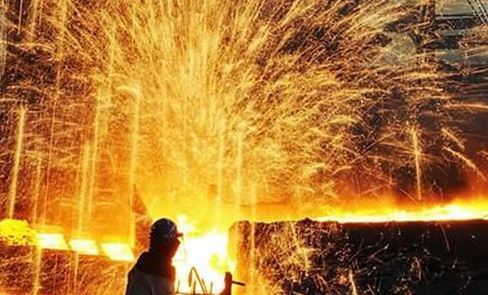Amid intensifying trade protectionist measures against South Korea’s steel products by the US, Korea’s steel industry saw double digit growth in exports to the US last year, industry data showed Sunday.
The total volume of steel shipments to the US dropped 4.9 percent on-year between January and November last year. But in value, the amount of exports rose 17.7 percent largely due to an increase in demand and price of oil country tubular goods, according to figures by Korea International Trade Association.
Korea shipped 3.4 million tons of steel products to the US in 2017, totaling $3.4 billion from $3.1 billion in 2016.
Oil country tubular goods refer to drill pipes, casing and tubing used in the petroleum industry to extract oil and natural gas. Demand for oil country tubular goods in the US hiked on surging popularity of shale gas.
 |
(Yonhap) |
According to industry insiders, the boost in profit is not all good news for the country’s steel industry.
“The US is highly likely to push for tighter regulations against Korea’s steel products in the soon-to-be-released results of the Section 232 probe citing increased amount,” said an official of Korea Iron and Steel Association.
“Heightened tariffs on Korean automobiles, which the US is said to be pushing for in the revision of the KORUS FTA, will also affect the steel industry.”
US President Donald Trump had invoked Section 232 of the Trade Expansion Act of 1962, which allows imposing tariffs or quotas on imports that threaten national security, and launched a probe into steel imports in April 2017.
The US Commerce Department will report the results of the probe by Jan 14.
In a move to impose stricter measures on Korean steel products, the US government levied 46.37 percent of anti-dumping tariffs on OCTG imports from Korea‘s Nexteel in October last year.
Prior to the hike up, the US government had slapped anti-dumping tariffs of 9.9 percent to 15.8 percent on OCTGs from Korea’s Hyundai Steel, Nexteel and Seah Steel in 2014.
Korea‘s steel shipments to the US reached up to $5.7 billion in 2014, up 49.4 percent from $3.8 billion a year earlier, according to KITA.
Yoo Myung-hee, director-general of the ministry’s trade policy bureau, and US Assistant Trade Representative Michael Beeman concluded the first round of talks to revise the KORUS FTA in Washington last Friday.
According to the ministry, the two confirmed their stances regarding the automobile and agricultural and livestock sectors.
By Kim Bo-gyung (
lisakim425@heraldcorp.com)








